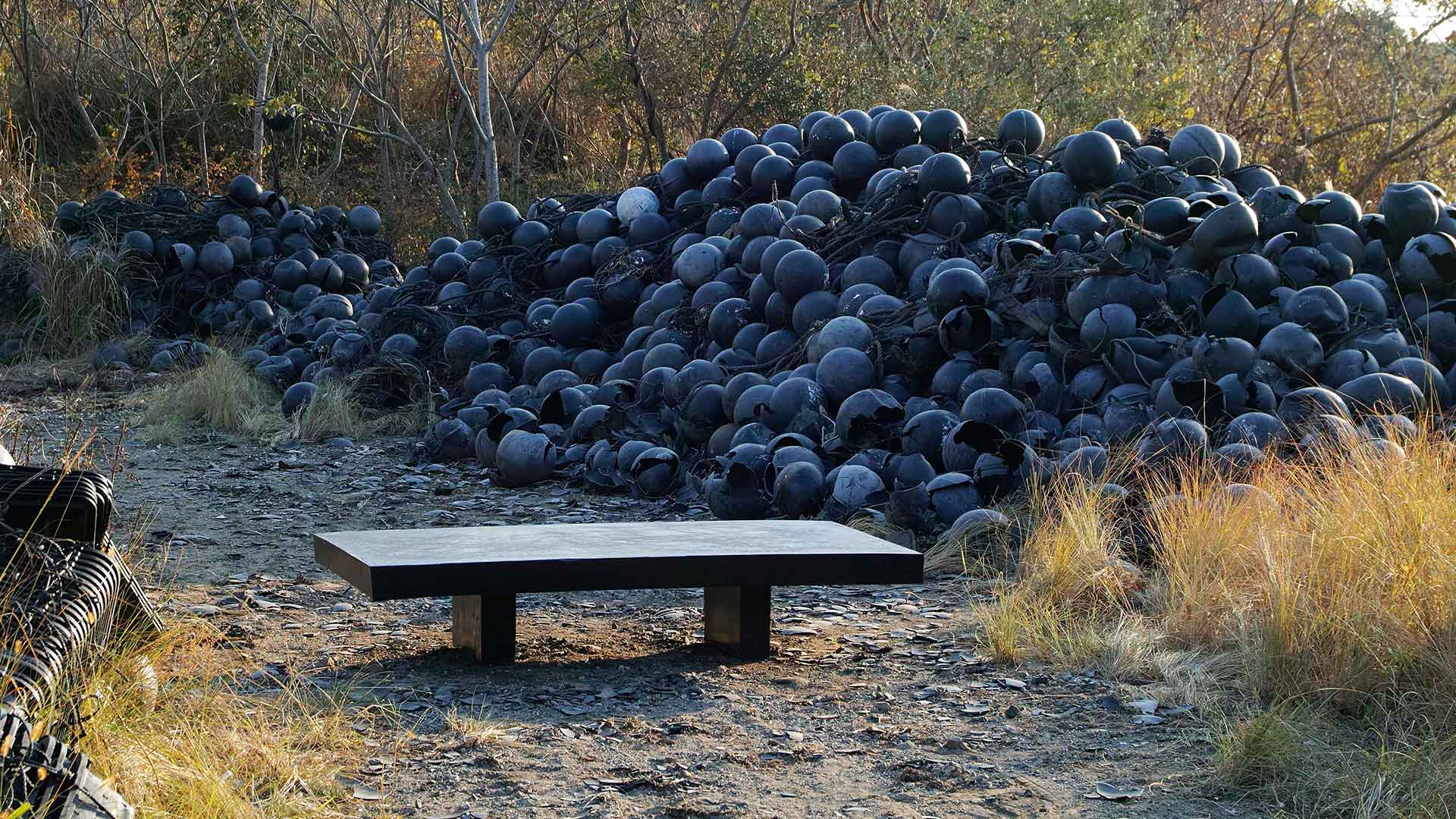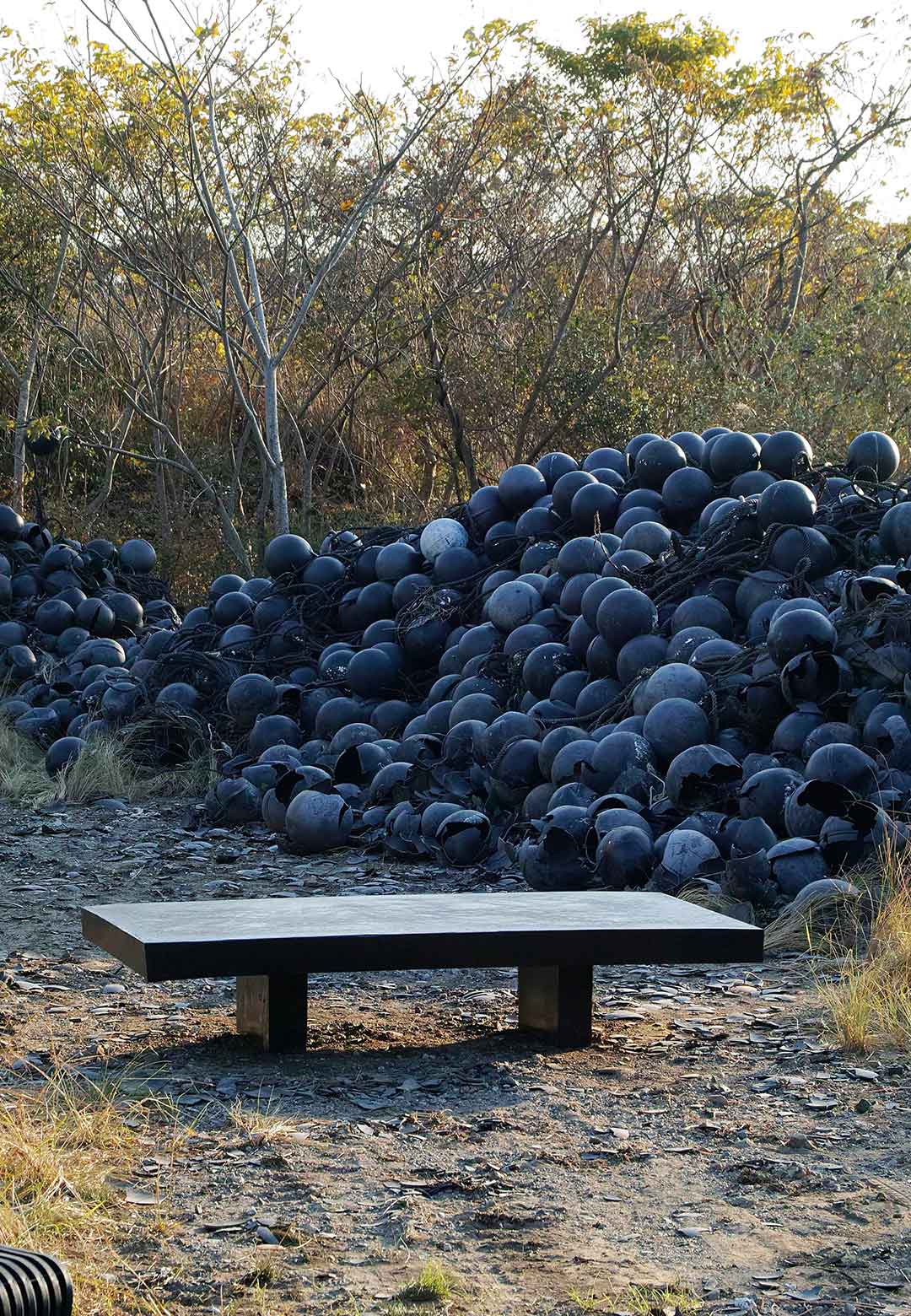Japan's stronghold as a major fishing nation of the world can be attributed to its outstretched coastline, a fortuitous location on the global map, and a cultural dependency on fishing both for food and occupation. What is known as the Japanese fishing industry now, grew from simple traditional practices and skills that have long defined the Japanese landscape. But similar to almost every aspect of life, this humble and staple occupation evolved into an ‘industry’ with the onslaught of capitalism. Propelled forward not by needs but by profit, a tradition that sustainably harnessed marine living resources, gradually swerved towards a path more detrimental. As of today, oceans carry the insufferable weight of countless tons of waste—a thriving ecosystem stifled by plastic waste and oil spills—the global fishing industry being a dominant antagonist. Can these discards floating aimlessly in the oceans and seas forge objects of livelihood?
Salvaging discarded material life
London-based architectural design studio PAN- PROJECTS collaborates with REMARE, a sustainable start-up in Japan, to reinstate positive value to this ocean plastic. ‘mum’ is a product design project that harnesses industrial ocean plastics by upcycling obsolete plastic fishing gears and other by-products of the fishing industry to create furniture design. The project involves working closely with the local fishing community and unearthing the neglected value in old tools such as nets and buoys that would otherwise end up polluting nature. “In a world where marine plastics have become part of the environment, ‘mum’ redefines these materials and damaged fishing gear as blessings from the sea. Instead of conceiving ocean plastics as pollution, ‘mum’ accepts them as part of a new nature,” the team shares.
The project’s name 'mum' is a derivative of the traditional interpretation of 'Mother Nature' in Japanese culture. In midsts of the unending expanse of the sea, the country has inherently revered the ocean before the land—its people fuelling their sustenance from the ocean and its boons.
New nature
The term ‘ocean plastic’ is a cleverly coined oxymoron apropos of the two antipodes that it constitutes. While ‘ocean' represents nature, 'plastic' infuses it with a human-made element. Through this semantic vicinity, the often hated human-made creations appear closer to nature, and plastic products seem to have somehow assimilated with the natural world. Ocean plastics, however, pollute oceans, and threaten ecosystems and marine life—becoming an emblem of the destruction humans have brought upon nature.
The fact that in this Anthropocene age scientists have concluded that it is impossible to entirely extricate ocean plastics from nature, attests that we now reside in a 'new nature,' where ocean plastics are a part of the environment. “Can we see ocean plastics as another gift from our Mother Sea?” the product designers question. “Imagine the near future, when our society has banned the production of plastics, people will need to harvest plastics from the sea just like they harvest seafood. As its recovery becomes the norm, will there still be a difference between harvesting fish, oysters, seaweed, and marine plastics?” they add.
Tools of the past, discards of the present, objects of the future
While fishermen harvest food from the ocean for sustenance, their resinous fishing gear is often damaged by the marine environment. Subsequently, a colossal volume of abandoned buoys, nets, and ropes come forth as by-products of the industry. PAN- PROJECTS enunciates their belief that these scraps must also be envisaged as valuable resources from the sea—shifting the perception of ocean plastic from pollution to a precious resource. Reimagining by-products as a product of the fishing industry, the designers conceive a dining table for feasting on seafood—connecting the sea, the fishery, and their by-products.
The table design dons a unique wave pattern that mirrors the sea's capricious character; the light that reflects off the surface emulates the ever-changing texture of the sea. The pattern is achieved through the recycling process, with factors such as dirt, sea salt, and size of fragments, that define the nature of ocean plastics, being contributors. The inevitable conflict from plastic materials being left in nature becomes the protagonist in ‘mum,’ highlighting the unpredictable character of ocean plastics. The stark black gloss of ‘mum’ speaks of the origin of the material, evocative of the calm yet volatile waves of the dark Japanese sea.
Redefining our perceptions of waste
Through the project, ‘mum,’ underlines a perspective we often fail to broach, one where waste is deemed a natural resource—a friend and not a foe. Through upcycled design, the project appreciates the singular character of ocean plastics, which sets them apart from factory-produced plastics. As the texture of the material undulates due to dirt and sea salt, the designers accept the uncontrollability as a defining characteristic of the material. A growing caravan of recycled products are emerging across the globe, and PAN- PROJECTS joins the crusade by choosing to craft sustainable design, while highlighting the preciousness of the infamous antagonist—ocean plastics.






 Sign in with email
Sign in with email








What do you think?